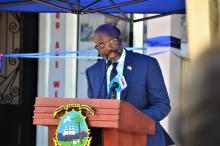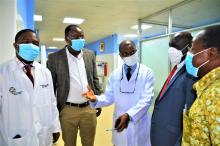President Weah commissions Liberia’s first National Dialysis Center and names it in honour of his predecessor
Monrovia, March 2, 2022: Patients with acute and chronic renal conditions in Liberia can now afford a smile as they no longer have to go abroad to seek dialysis services, thanks to the opening of a new National Dialysis center in Monrovia.
It’s been a journey of over a decade to establish the center whose foundations commenced during the leadership of President George Manneh Weah's predecessor, Madame Ellen Johnson Sirleaf, following the dire need for the services in Liberia for decades. In his commissioning speech, the President appropriately named the EJS Dialysis Center, in honor of Madame Ellen Johnson Sirleaf.
"When I was elected President in 2018, I was informed of the Dialysis Center Project, which began in 2011 under the leadership of our former President, Madame Ellen Johnson Sirleaf, and instructed my Minister of Health then to prioritize the project, and 4 years later, we are here today. This is an important milestone in ensuring that we provide comprehensive health care to the people of Liberia, " President Dr. George M. Weah stated.
The opening of this facility relieves financial, social, and psychological pressure on Liberians who had to travel to other countries to seek services that were not available locally, as well as those who could not afford to raise the funds required to obtain these life-saving services in neighboring countries and beyond.
"No one needed to tell you how costly seeking the service has been. Not only would one have to worry about the cost of treatment in a foreign country, but the airfare, accommodation, and so many other associated costs, which made the overall cost of this lifesaving treatment unaffordable for many," said President Weah.
"Grossly underestimated-our statistics show that from 2013 to 2021, 243 cases were diagnosed with chronic renal failure and 195 patients died of the condition, representing 80.2%, meaning that out of every 10 people, 8 died – a worrisome situation. These statistics do not include the people under 30 who also developed the disease. I hope this explains my excitement. I am excited because many Liberians with the condition will have the privilege of seeking care in their own country, "said the Honorable Minister of Health, Dr. Wilhelmina Jallah, at the opening of the 10-bed facility in Monrovia.
The pertinent need for dialysis services in Liberia became more evident during the COVID-19 pandemic as patients with renal disease could not get the required assistance in the country. Coupled with the uncontrolled prevalence of non-communicable diseases (NCDS) such as hypertension and diabetes, which greatly contribute to renal failure, made the situation deplorable during the pandemic.
"The combination of both COVID-19 and NCDSs reinforces the need to strengthen the health system at this specialty facility. It is another milestone in Liberia’s health system and has the potential to deliver safe and effective treatment that can preserve the lives of people with end-stage renal disease. I congratulate the President, His Excellency. Dr. George M. Weah for this achievement and prioritizing the health agenda" expressed the World Health Organisation (WHO) Liberia Country Representative, Dr. Peter Clement.
The WHO Liberia Country Representative, Dr. Clement, further observed that as the prevalence of chronic kidney disease (CKD) and related deaths in Liberia is unknown, the double burden of non-communicable and communicable diseases is a reminder to focus on cost-effective preventive measures, which include maintaining healthy lifestyles. Liberia is currently undertaking a national risk-factors survey on non-communicable diseases (NCDs) whose results will generate new evidence on Liberia's data to inform policy and strategic direction.
Chronic kidney disease (CKD) is causing an increase in renal problems all over the world, with a bigger burden in developing countries. The global burden is estimated to be between 10% and 30%, with a similar figure of around 13.9 % in Africa. Due to late case presentation, dialysis discontinuance, and substandard dialysis service quality, the death toll in Sub-Saharan Africa is very high.
The WHO supported the Ministry of Health with the refurbishment of the EJS National Dialysis facility and contributed to the training of nurses and biotechnologists, as well as the purchase of the first lot of consumables, with financial help from the World Bank.




